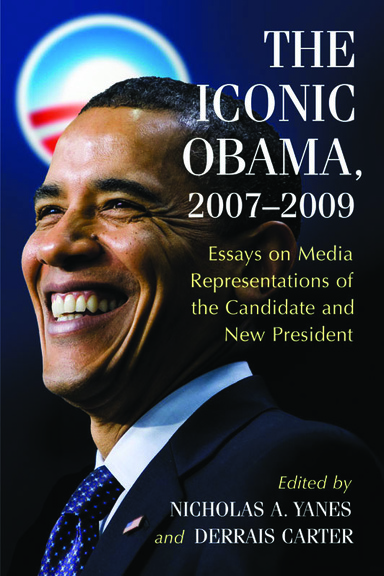As the 44th president of the United States, Barack Obama has been a lens through which people worldwide have interpreted the politics, art, comics, and music present in their lives.

To examine this cultural phenomenon, University of Iowa graduate students Nicholas Yanes and Derrais Carter compiled and edited essays and interviews for The Iconic Obama, 2007-2009: Essays on Media Representations of the Candidate and New President, published this fall by McFarland & Company, Inc., Publishers.
This book presents a series of viewpoints that explore the widespread enthusiasm associated with Obama and the resulting implications for the study of popular culture. The essays in this collection focus on the buildup to the 2008 election as well as Obama's first year as president. The contributors represent a variety of scholarly standpoints, each adding a unique perspective on Obama's relationship to popular culture.
“The book is about understanding the capacity of people to create and unleash their own interpretations of our leaders,” says Carter, a doctoral student in American studies and Dean’s Graduate Research Fellow. “There is no one way to represent them. We do it through different lenses.”
These representations appear in newspapers, on television, and on the Internet; yet they also have implications for the study of music, film, and comic books.
Yanes says the image of the country’s first black president is inescapable. The idea for this book is an example.
“The book was inspired by my niece, who was five at the time,” says Yanes, also a doctoral student in American studies and Dean’s Graduate Research Fellow. “She told me there’s a new candidate and she wanted me to vote for him. I thought there must be something unique about how Obama influences public rhetoric.”
The essays are grouped into six sections—Forging a Brand: Introducing Obama-Mania; Film and Television: Televised Change; Hip-Hop Culture: Remixed Response to Obama’s Popularity; Comic Books: Obama’s Popularity and the Original Superhero Medium; News Media and New Media: The Impact of Presidential News Politics and Digital Social Networks; and International Responses: Obama’s Popularity Goes Global.
For Yanes, collecting the essays served as an insightful reminder of the world’s interconnectedness.
“People around the world are sort of borrowing our cultural tropes, but re-deploying them in unique ways,” Yanes says. “In the United States, we had the Obama Girl phenomenon with the YouTube video of the girl singing, ‘I have a crush on Obama.’ In Japan, they had the Obama Girls, which was a group of women who supported Obama and encouraged people to support Obama.”
The book offers no commentary on Obama’s political agenda, instead emphasizing the possibilities his campaign created in both the United States and abroad. This project’s overarching argument is that President Obama’s campaign and transition into the White House created a space in which activists, politicians, fans, and artists converged, using Obama’s image to represent their respective ideologies.
“We are interested in how people work through his image. Our intent is not to say we’re pro- or anti-Obama,” Carter says. “We’re more interested in how people make meaning of Obama. That’s the more interesting narrative we’re building with this project.”
Carter especially enjoyed Travis Gosa’s essay, “The Audacity of Dope”: Rap Music, Race, and the Obama Presidency.
“Travis has this approachable way of writing that helps us understand how the politics of rap and rap music are connected to political ideologies,” Carter says. “He’s not saying all rap is political, but he’s saying it’s important for us to understand that some of these artists are also making meaning of Obama’s presence.”
Yanes and Carter’s collaborators for this project included national and international contributors. UI contributors included journalism and mass communication doctoral students Rauf Arif, James Carviou, Robert Gutsche, and Etse Sikanku, and American studies doctoral student Patrick Oray. Graduate College Associate Dean Dan Berkowitz also was interviewed about how to understand Obama’s election news coverage.
With the 2012 election fast approaching, additional representations of the candidates will proliferate as they attempt to increase their visibility. All the while, Obama’s campaign supporters will remix the image of the United States’ first black president.
The Iconic Obama, 2007-2009: Essays on Media Representations of the Candidate and New President can be purchased at Amazon.com.